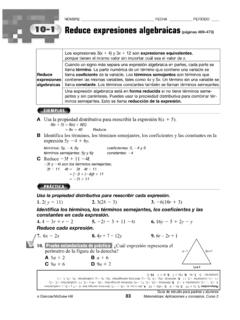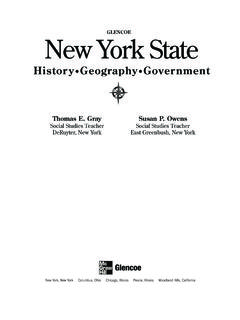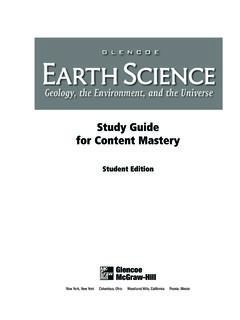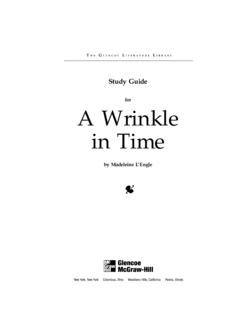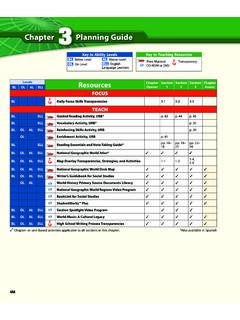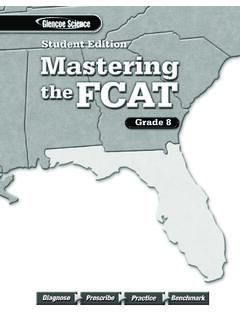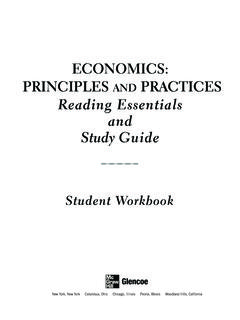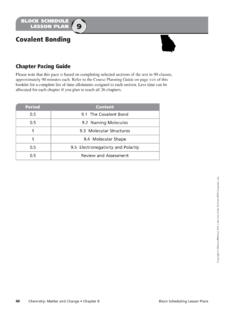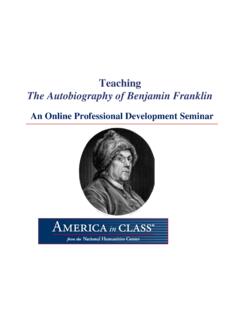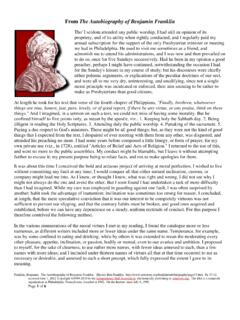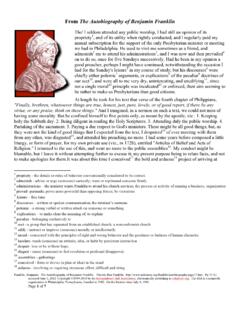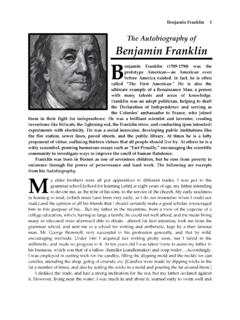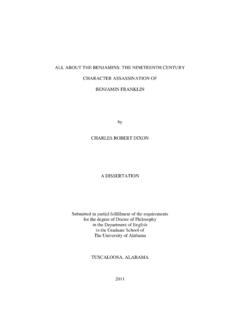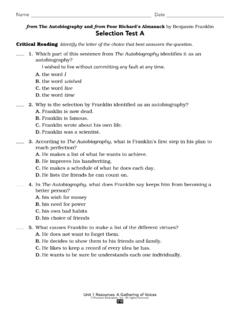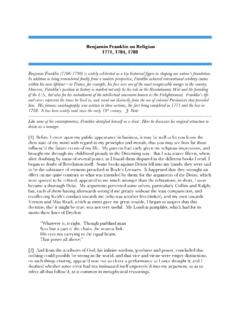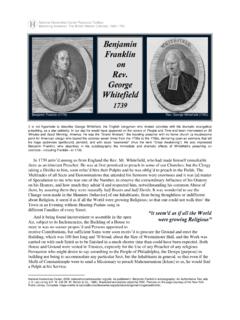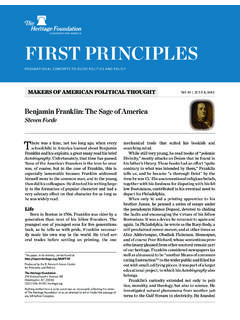Transcription of for The Autobiography of Benjamin Franklin - Glencoe
1 I Study GuideforTheAutobiography ofBenjamin Franklinby Benjamin FranklinTHEGLENCOELITERATURELIBRARYThe Autobiography of Benjamin Franklin Study Guide9 Copyright by The McGraw-Hill Companies, thought that his older brother Jameswas too hard on him, and they often fought. When his apprenticeship ended, Franklin went to Philadelphia. This city, far more than his birthplace of Boston, became Franklin s home. In Philadelphia he established his own business andraised his family. After Franklin retired from business in 1748, heembarked on a new career as a civil servant. Heserved in the Pennsylvania Assembly and becamedeputy postmaster-general. Sent to England as a rep-resentative of the Assembly, he spent five yearsthere. During that time, he made the acquaintanceof statesmen and scientists alike.
2 Years later, hereturned to England and found himself caught up inthe growing tension between the thirteen coloniesand the British government. Franklin s loyalties weredivided. He felt affinities to the colonies and to KingGeorge II of England. When he could tolerate theBritish government s policies toward the Americancolonies no longer, he sailed back to the the time his ship arrived, the first battles of theAmerican Revolution had already been was chosen to serve on the SecondContinental Congress, which, acting as the govern-ment for the colonies, declared independence fromBritain and appointed George Washington as com-mander in chief of the American army. Franklinwas one of five men selected to draft theDeclaration of Independence, the formal documentproclaiming freedom from British rule.
3 During the war, Franklin secured from Francefinancial assistance for the colonies. He also helpedformulate the peace treaty between the colonies andGreat Britain. He was present at Versailles in 1783when that treaty the Treaty of Paris was then returned to Philadelphia in 1785 to con-tinue his public service. He was a delegate to the1787 convention at which the Constitutionwas drafted. Three years later, in 1790, he s long list of diplomatic and politicalaccomplishments is impressive. However, he alsocontributed to the well-being of the colonists onan everyday level. His inventions include a stovethat burned better than most, bifocals, and thelightning Benjamin FranklinIf you would not be forgotten, as soon as you aredead and rotten, either write things worth reading, or do things worth the writing.
4 Benjamin Franklin , Poor Richard s Almanack,1738enjamin Franklin was a true Renaissanceman. He was a diplomat, philosopher, inven-tor, scientist, and businessman. He wrote letters,articles, pamphlets, scientific papers, and an auto-biography. Despite his later prominence, Franklin hadhumble beginnings. Franklin s father, Josiah, hadseventeen children from two marriages. Benjaminwas the fifteenth child, born in 1706, and theyoungest son. Josiah was a candlemaker and soap-maker in Boston, and he had to struggle to sup-port his large family. At first, Josiah Franklin planned to haveBenjamin become a minister. But, after consider-ing the expense of educating his son and the poorfinancial prospects in that profession, he decidedthat Benjamin should learn a trade Benjamin showed an interest in read-ing and writing, Josiah apprenticed him toanother of his sons, James, a printer.
5 Franklinidentified himself with this trade to his last days,even though he retired from his own printinghouse when he was only forty-two years Autobiography of Benjamin Franklin Study GuideCopyright by The McGraw-Hill Companies, Inc.[T] here are some books that never lose theirappeal.. They are as vivid and interestingtoday as they ever were, and they will continue tobe so until humanity itself has changed.. Benjamin Franklin s Autobiography is one of is the first American success story. from the introduction of a 1941 edition of theautobiography, published by Walter J. Black, New YorkBenjamin Franklin was a prolific writer. In his manypamphlets, he wrote about everything from papercurrency to the proper relationship between a kingand his colonies. He wrote scholarly articles aboutelectricity and other scientific topics, and hisalmanac was full of practical advice on all manner oftopics.
6 He also wrote hundreds of newspaper articleson social and political subjects. Only in his Autobiography did Franklin writeabout himself. Although it does not provide achronological account of his life, it does shed lighton the actions that Franklin took to rise frompoverty to over a span of eigh-teen years, the Autobiography is generally dividedinto four parts. The first part of the manuscript waswritten in 1771 in Twyford, a village about fiftymiles outside of London. Franklin composed it forthe benefit of his son, William, who was governor ofNew Jersey at the Two, the shorter section, was writtenalmost thirteen years later when Franklin was livingin France as a representative for the United devotes this part to his plan for self-improvement moral perfection, as he calls it.
7 Thevirtues he sets out for himself are ones that hebelieves anyone can attain with strong will anddetermination. Even as a young man, he decidedthat, by industry and frugality, he would win therespect of colleagues as well as influential persons inhis community. Given Franklin s reputation, whichhas endured to this day, it is safe to say that his plan worked. The final sections were written in Philadelphiain 1788 and during the winter of 1789. These wereFranklin s last years. Although he was very ill, hemanaged to dictate the words to his grandson,recording events in his life up to 1758, the point atwhich Franklin began the most public part of hiscareer. Upon his death, Philadelphia gave him afuneral befitting the man who had, as French economist Anne-Robert-Jacques Turgot put it, snatched the lightning from the skies and the sceptre from tyrants.
8 In his Autobiography , Franklin mentions manymen both English and American who helpedhim, interested him, or challenged him with theirviews or their wit. On many occasions, he estab-lished friendships with men who had read a little and whose conversation was therefore interesting to him. Franklin was always drawn to people whowanted to improve themselves, just as he did. He notes that his rise from humble beginningsmight serve as an example to others: Having emerged from the poverty and obscurityin which I was born and bred to a state ofaffluence and some degree of reputation in theworld, .. [others may find my methods]suitable to their own situations and therefore fitto be TIME AND PLACEOne distinguishing feature of Franklin sPennsylvania was that it was a colonies were formed from large tracts ofland in America given to individuals by the kings of England.
9 The individuals could supervise anddevelop these colonies. William Penn s father servedKing Charles I of England for many years. Even afterthe king s execution, Admiral Penn continued tosupport the monarchy. During the English civil war(1642 1649), the Admiral went unpaid for his ser-vices. Upon his death, the government owed him asignificant sum. His son, William, petitioned thenew king, Charles II, to pay the sum by grantinghim land in North America. On March 4, 1681,Charles II s government approved Penn s was given the responsibility of enlargingthe empire, furthering its wealth, and civilizing theNew World by gentle and just manners. Penn had free, full and absolute power to make laws for thecolony. Of course, the laws had to conform withIntroducing the NovelThe Autobiography of Benjamin Franklin Study Guide11 Copyright by The McGraw-Hill Companies, was not only a philosopher, writer,businessman, and politician, he was also ascientist and inventor.
10 Most people arefamiliar with his famous lightning experi-ment, but Franklin also dabbled in meteorol-ogy, music, medicine, optics, andoceanography. Franklin was practical. If he needed atool to help him perform a task more effi-ciently, he created it. As a young boy hefashioned swim fins out of two pieces ofwood and wore them on his hands to propelhimself through the water. Later he inventeda long-handled tool to retrieve books fromhigh he aged, Franklin came up with a wayto improve his vision. Franklin needed onepair of glasses to read and another to seethings at a distance. He grew tired of con-stantly switching glasses, so he decided toturn two pairs of glasses into one. He cuthalf a lens from each pair and combined thetwo pieces to create the first also was interested in meteorol-ogy.
